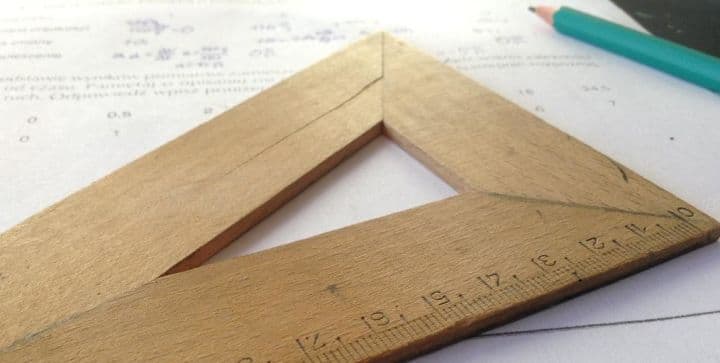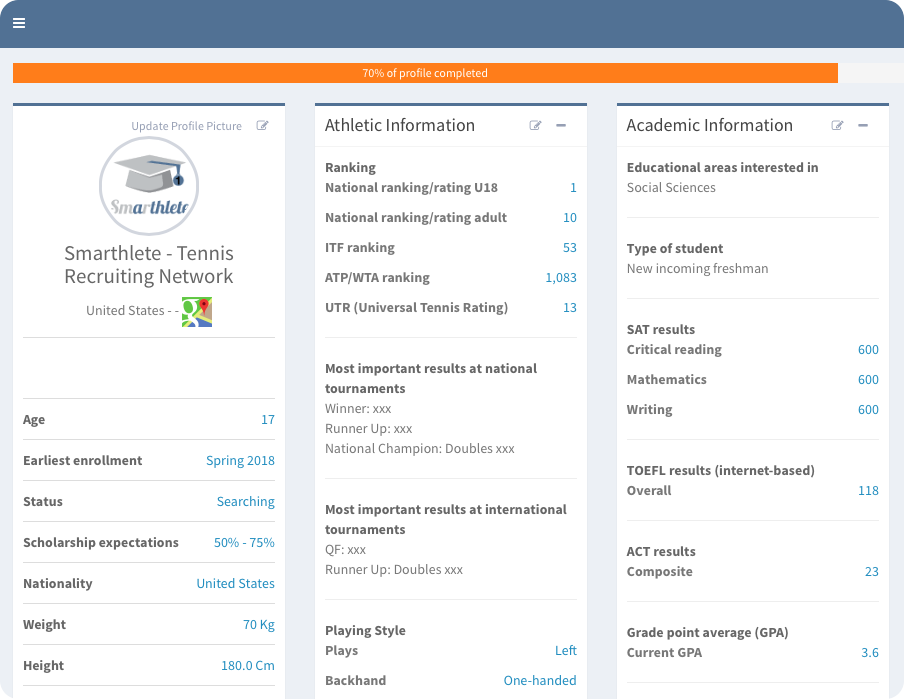2 Academic Focus Areas For Tennis Recruits to Boost Their Chances

Universities grant a significant amount of financial aid to its applicants thanks to their academic accomplishments prior to enrolment.
Stanford for example offers an average financial aid of $36,893 to undergraduate students (Source: startclass by Graphiq).
Without doubt, that's a lot of money.
It's a lot of money also in the eyes of the coaches of the various tennis programs. Now there is something about the college tennis recruiting process that you should know about - and it has fairly little to do with your level of tennis. But it does have a lot to do with the scholarship offer you might be able to land in the end. Spoiler alert: no coach has unlimited amounts of athletic scholarship money. Quite the opposite and that's why academic scholarships are of such interest; not only for you, but also for the coach. Your grades matter a great deal!
Continue on if you like what you are reading...
Academic Accomplishments of Prospective Student Athletes
Let's face it. Chances are you are in your final years of high school - a junior, maybe senior even - and you are right on track to start studying very, very soon. But that's not going to happen unless you graduate from high school with the official diploma in your hand. But it's also not going to happen unless you deliver test scores, which show reliable proof of your abilities. That's what this blog article will be about today - 1) your performance at high school, and 2) your performance on these tests:
1) High School Performance
Your applications include your high school transcripts. A direct consequence of your grades at school are 2 things in particular:
- Grade Point Average (GPA)
All of your A's, B's, and C's are accounted for and reflected in the Grade Point Average. If you are an international tennis player you will need to get your grades converted to the American grading scale (GPA Calculator). - Percentile/Class Rank
Whereas the Percentile Range gives admissions offices a rough idea, the Class Rank states exactly how well you have done in high school compared to your colleagues.
2) Scholastic Test Scores
Your applications also include your scholastic test scores:
- ACT
6 test dates throughout the year (5 international test dates), during which you're tested in English, Math, Reading, and Science. Your composite score will be the average of all 4 sub-sections with a maximum of 36 points. - SAT
7 test dates throughout the year (6 international test dates), with a maximum of 1,600 total points available in the new SAT format. The SAT tests you in Mathematics and Evidence-Based Reading and Writing. - TOEFL (IF your mother tongue is not English)
The TOEFL is offered many times a year, with a total of 120 points available in 4 sections: Reading, Listening, Speaking, Writing.
How Does This Help in Getting Recruited by a College Tennis Team?
Now that is the really relevant question of today's Friday Scholarship Guide. You might not have heard about the difference between head-count sports and equivalency sports before, but it's essentially the difference whether coaches have full-ride scholarships or partial scholarships available. Unless you are a girl, aiming for a NCAA D-I scholarship, you will most likely not be in the position to receive a 100% scholarship. Read more on "How Many Scholarships Tennis College Coaches Can Offer to Their Players" here.
That means the majority of players will be faced with paying the remaining amount of tuition, room & board, and material expenses out of their own (their parents') pocket.
Coaches have large interest in recruiting players who might qualify for academic scholarship money at their college. How so? Let's look at an example:
Put yourself in the situation of a head coach of a tennis program who has 4.5 full scholarships (NCAA D-I men's tennis) available. Say you have obtained a solid GPA, but nothing extraordinary. On top of that you managed to deliver a TOEFL score which meets the requirements of the admissions office by far and an ACT result that is excellent. The coach has obvious reasons to hope that you might qualify for some sort of financial aid by the university, leaving untouched his pool of available athletic scholarship budget for now and he is able to "save some money".
In the end the coach could be able to offer you a much better - combined - scholarship package, because you "helped" him put it together.
The above is a wonderful win-win situation, made possible because of your good academic profile on top of the already attractive athletic skill set you showcased. But it doesn't end there quite yet - there are even more motives for having good grades in high school! But that's another topic - one we have covered before, so make sure to check it out right away: "4 Reasons a Good High School GPA Has an Impact on Your Athletic Scholarship".
Here at Smarthlete, our users can add all the academic accomplishments to their recruiting profiles. Get an idea of what your future recruiting profile could look like below:

Make sure you keep your grades up in the class room, register in time for the tests you are required to take, and prepare for them good time in advance! It could open up a great range of interesting talks with coaches!
Check out what Smarthlete has in store for you, register for free right away on smarthlete.com and get discovered by college coaches already today!
Any questions about SAT, ACT, GPA or alike? Send us a line on contact@smarthlete.com and we'll get back to you!